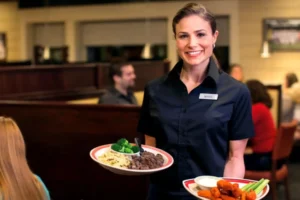Getting a job in the restaurant industry can be a rewarding experience that opens up opportunities for growth, skill development, and the chance to work in a dynamic, fast-paced environment. Whether you’re seeking your first job, looking to switch careers, or hoping to climb the ladder in the restaurant industry, this guide will provide you with the steps and strategies you need to successfully land a job at a restaurant.
Understanding the Restaurant Industry

Before diving into the job search, it’s important to understand the restaurant industry as a whole. The restaurant sector is diverse, with a wide range of establishments including fine dining, casual dining, fast food, cafes, bars, and food trucks. Each type of establishment offers different experiences and opportunities, and understanding these differences can help you target your job search more effectively.
Types of Restaurants
Fine Dining: These restaurants offer high-end service, gourmet food, and an upscale atmosphere. Jobs here may require more experience and specialized skills.
Casual Dining: A step down from fine dining, casual dining restaurants offer a more relaxed atmosphere while still providing quality food and service.
Fast Food: Known for quick service and lower-priced menu items, fast food restaurants often provide entry-level positions with opportunities for advancement.
Cafes and Coffee Shops: These establishments focus on beverages like coffee and tea, often paired with light meals or snacks. Jobs here may involve both food preparation and customer service.
Bars and Pubs: These establishments focus on serving alcoholic beverages, often with a limited food menu. Jobs here may include bartending, serving, or kitchen work.
Food Trucks: A mobile alternative to traditional restaurants, food trucks require staff to handle food preparation, customer service, and sometimes even driving the truck.
Front-of-House vs. Back-of-House Roles

Understanding the distinction between front-of-house and back-of-house roles is essential in determining where your interests and skills lie.
Front-of-House (FOH) Roles:
Server/Waitstaff: The face of the restaurant, servers interact directly with customers, taking orders, delivering food, and ensuring a positive dining experience.
Host/Hostess: Responsible for greeting customers, managing reservations, and coordinating seating. This role requires strong organizational and customer service skills.
Bartender: Prepares and serves alcoholic and non-alcoholic beverages, often interacting with customers and managing the bar area.
Busser/Runner: Assists servers by clearing tables, refilling drinks, and delivering food from the kitchen to the dining area.
Back-of-House (BOH) Roles:
Line Cook: Prepares dishes according to the restaurant’s recipes and standards. This role requires culinary skills and the ability to work under pressure.
Prep Cook: Assists the kitchen staff by preparing ingredients, such as chopping vegetables or marinating meats, before they are cooked.
Dishwasher: Ensures that all dishes, utensils, and kitchen equipment are clean and ready for use.
Pastry Chef/Baker: Specializes in creating baked goods and desserts. This role may require specialized training and experience.
Assessing Your Skills and Interests
Before applying for a job, take some time to assess your skills, interests, and career goals. This will help you identify the types of roles that are best suited for you.
Self-Assessment
Customer Service Skills: If you enjoy interacting with people and have strong communication skills, you may thrive in a front-of-house role.
Culinary Skills: If you have a passion for cooking and enjoy working with food, a back-of-house role may be more appropriate.
Work Environment: Consider whether you prefer a fast-paced, high-energy environment (common in fast food and casual dining) or a more refined, slower-paced setting (common in fine dining).
Physical Stamina: Restaurant work can be physically demanding, requiring long hours on your feet, the ability to lift heavy items, and the endurance to work in a hot kitchen or busy dining room.
Flexibility: Many restaurant jobs require flexible hours, including evenings, weekends, and holidays. Be honest with yourself about your availability and willingness to work these hours.
Setting Career Goals
Consider where you want your career to go in the restaurant industry. Are you looking for a part-time job to earn extra money, or are you hoping to build a long-term career with opportunities for advancement? Setting clear goals will help guide your job search and inform your decisions along the way.
Crafting a Winning Resume and Cover Letter
A well-crafted resume and cover letter are essential tools in your job search. They provide potential employers with a snapshot of your experience, skills, and personality, helping you stand out from other applicants.
Building Your Resume
Your resume should be concise, easy to read, and tailored to the restaurant job you’re applying for. Here’s how to structure your resume:
Contact Information: Include your full name, phone number, email address, and (optionally) your home address. Make sure your email address is professional.
Objective Statement: A brief statement (1-2 sentences) that summarizes your career goals and why you’re applying for the job. Tailor this statement to each job application.
Work Experience: List your work experience in reverse chronological order, starting with your most recent job. Include the name of the employer, your job title, the dates you worked there, and a brief description of your duties and accomplishments. Highlight any experience relevant to the restaurant industry, such as customer service, food handling, or teamwork.
Skills: Create a list of relevant skills, such as “customer service,” “cash handling,” “food preparation,” “teamwork,” or “multitasking.” Include any certifications, such as food safety training or a bartending license.
Education: Include your highest level of education, as well as any relevant coursework, degrees, or certifications.
Writing an Effective Cover Letter
A cover letter is your chance to introduce yourself to the employer and explain why you’re the best candidate for the job. Here’s how to write a compelling cover letter:
Begin with a strong opening that grabs the employer’s attention. Mention the position you’re applying for and how you heard about the job.
Body: Explain why you’re interested in the job and what makes you a suitable candidate. Highlight specific skills, experiences, or qualities that align with the job requirements. Use this section to showcase your enthusiasm for the role and the restaurant.
Wrap up your letter by expressing your eagerness to discuss your application further. Provide your contact information and thank the employer for their consideration.
Searching for Job Openings
Now that your resume and cover letter are ready, it’s time to start searching for job openings. There are several ways to find restaurant jobs, both online and in person.
Online Job Boards
Online job boards are a convenient way to find restaurant job openings. Some popular job boards include:
Indeed: One of the largest job search engines, Indeed allows you to search for restaurant jobs by location, job title, and salary range.
Glassdoor: Glassdoor provides job listings as well as company reviews, salary information, and interview tips.
LinkedIn: LinkedIn is a professional networking site that also features job listings. You can connect with industry professionals, follow companies, and apply for jobs directly through the platform.
Local Job Boards: Many cities have local job boards or classifieds websites where restaurants post job openings. These sites can be a great resource for finding smaller, independently-owned restaurants.
Restaurant Websites and Social Media
Many restaurants post job openings directly on their websites or social media pages. Visit the careers section of restaurant websites to see if they’re hiring. Follow restaurants on social media platforms like Facebook, Instagram, or Twitter to stay updated on job postings and hiring events.
Getting a job at a restaurant is a process that requires preparation, persistence, and a positive attitude. By understanding the restaurant industry, assessing your skills, crafting a strong resume and cover letter, searching for job openings, preparing for interviews, and excelling in your role, you can successfully land a job in the restaurant industry and set the stage for a rewarding career.
Whether you’re just starting out or looking to advance in the field, the opportunities in the restaurant industry are vast and varied. With the right approach and a commitment to excellence, you can achieve your career goals and thrive in this dynamic industry.




